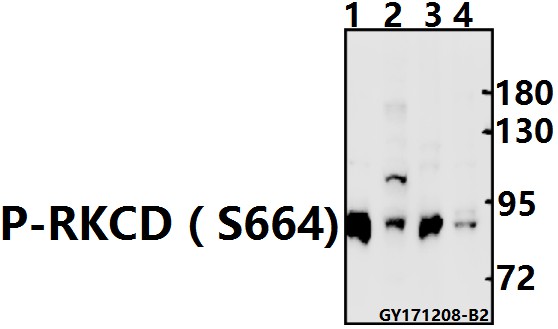Product Name :
PKC δ/RKCD (phospho-S664) polyclonal antibody Background :
Protein kinase C (PKC) family members influence a variety of cellular functions, including cell growth, cell differentiation, hormone secretion and membrane function. PKC isoforms are calcium and phospholipid-dependent serine/threonine protein kinases. Diacylglycerols (DAG) and tumor promoting phorbol esters bind to and activate PKC. PKC δ phosphorylation on Thr 507 mediates inhibition of JAK2 and Stat3 function. PKC δ phosphorylates and associates with Stat3 on Ser 727 following induction by IL-6 to negatively regulate the DNA binding and transcriptional activity of Stat3. The Tyr 525, 523 and 565 residues in the catalytic domain are crucial for activation of PKC δ. The Tyr 52, 155 and 187 residues of PKC δ reside within a regulatory domain. The residue Ser 643 appears to be an autophosphorylation site. Product :
Rabbit IgG, 1mg/ml in PBS with 0.02% sodium azide, 50% glycerol, pH7.2 Storage&Stability :
Store at 4°C short term. Aliquot and store at -20°C long term. Avoid freeze-thaw cycles. Specificity :
p-RKCD (S664) pAb detects endogenous levels of p-RKCD (S664) protein only when phosphorylated at Ser664. Immunogen :
Synthetic phosphopeptide derived from human PKCD around the phosphorylation site of Serine 664 Conjugate :
Unconjugated Modification :
Phosphorylation
PKC δ/RKCD (phospho-S664) polyclonal antibody Background :
Protein kinase C (PKC) family members influence a variety of cellular functions, including cell growth, cell differentiation, hormone secretion and membrane function. PKC isoforms are calcium and phospholipid-dependent serine/threonine protein kinases. Diacylglycerols (DAG) and tumor promoting phorbol esters bind to and activate PKC. PKC δ phosphorylation on Thr 507 mediates inhibition of JAK2 and Stat3 function. PKC δ phosphorylates and associates with Stat3 on Ser 727 following induction by IL-6 to negatively regulate the DNA binding and transcriptional activity of Stat3. The Tyr 525, 523 and 565 residues in the catalytic domain are crucial for activation of PKC δ. The Tyr 52, 155 and 187 residues of PKC δ reside within a regulatory domain. The residue Ser 643 appears to be an autophosphorylation site. Product :
Rabbit IgG, 1mg/ml in PBS with 0.02% sodium azide, 50% glycerol, pH7.2 Storage&Stability :
Store at 4°C short term. Aliquot and store at -20°C long term. Avoid freeze-thaw cycles. Specificity :
p-RKCD (S664) pAb detects endogenous levels of p-RKCD (S664) protein only when phosphorylated at Ser664. Immunogen :
Synthetic phosphopeptide derived from human PKCD around the phosphorylation site of Serine 664 Conjugate :
Unconjugated Modification :
Phosphorylation
-
 Western blot (WB) analysis of p-RKCD (S664) pAb at 1:500 dilution Lane1:Hela whole cell lysate(10ug) Lane2:A549 whole cell lysate(40ug) Lane3:The Uterus tissue lysate of Mouse(20ug) Lane4:The Uterus tissue lysate of Rat(20ug)
Western blot (WB) analysis of p-RKCD (S664) pAb at 1:500 dilution Lane1:Hela whole cell lysate(10ug) Lane2:A549 whole cell lysate(40ug) Lane3:The Uterus tissue lysate of Mouse(20ug) Lane4:The Uterus tissue lysate of Rat(20ug)
Bioworld Biotech only provide peptides for our antibodies and do not provide additional peptide customization services.
Price/Size :
USD 368/1mg/vial
Tips:
For phospho antibody, we provide phospho peptide(0.5mg) and non-phospho peptide(0.5mg).Describe :
Blocking peptides are peptides that bind specifically to the target antibody and block antibody binding. These peptide usually contains the epitope recognized by the antibody. Antibodies bound to the blocking peptide no longer bind to the epitope on the target protein. This mechanism is useful when non-specific binding is an issue, for example, in Western blotting (WB) and Immunohistochemistry (IHC). By comparing the staining from the blocked antibody versus the antibody alone, one can see which staining is specific; Specific binding will be absent from the western blot or IHC performed with the neutralized antibody.Formula:
Synthetic peptide was lyophilized with 100% acetonitrile and is supplied as a powder. Reconstitute with 0.1 ml DI water for a final concentration of 10 mg/ml.The purity is >90%,tested by HPLC and MS.
Storage:
The freeze-dried powder is more stable. For short time at 2-8°C. For long term storage store at -20°C.
Note :
This product is for research use only (RUO only). Not for use in diagnostic or therapeutic procedures.
 PKC δ/RKCD (phospho-S664) polyclonal antibody
PKC δ/RKCD (phospho-S664) polyclonal antibody  Datasheet
Datasheet COA
COA MSDS
MSDS SHIP
SHIP